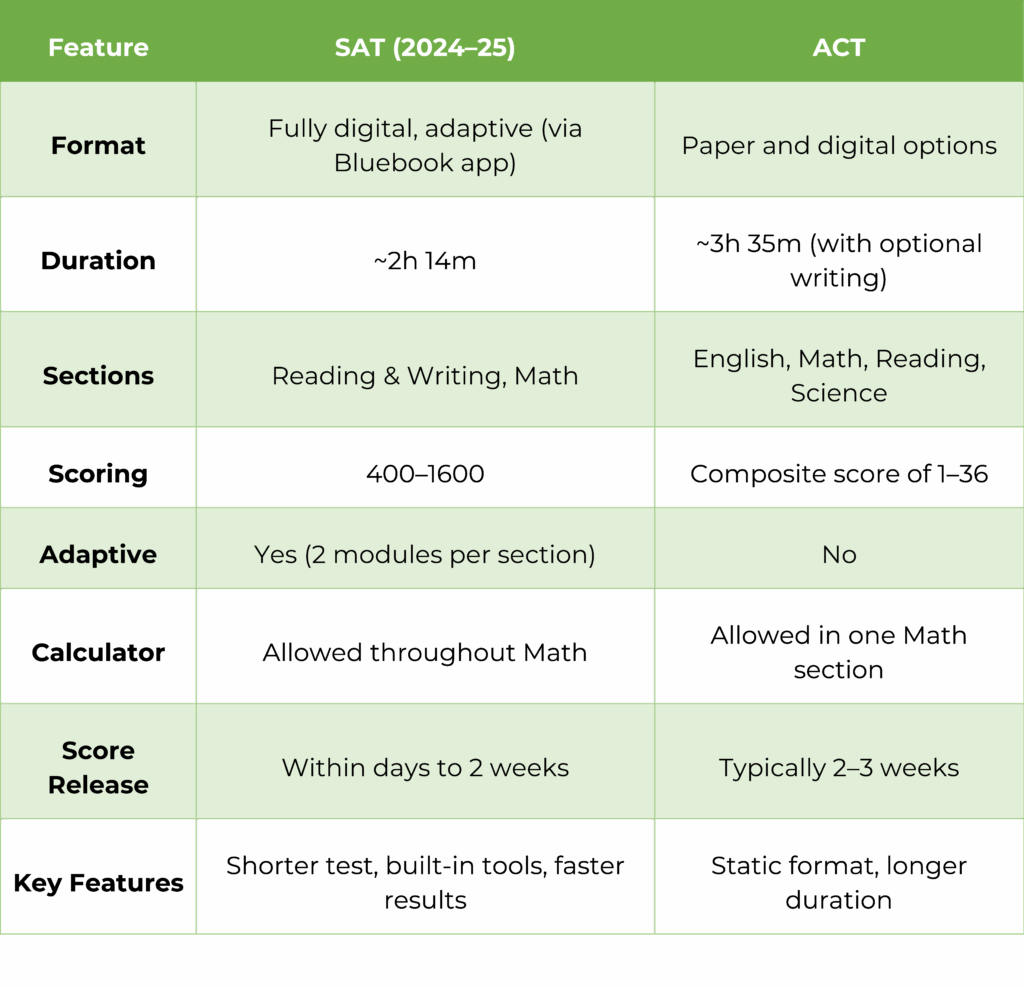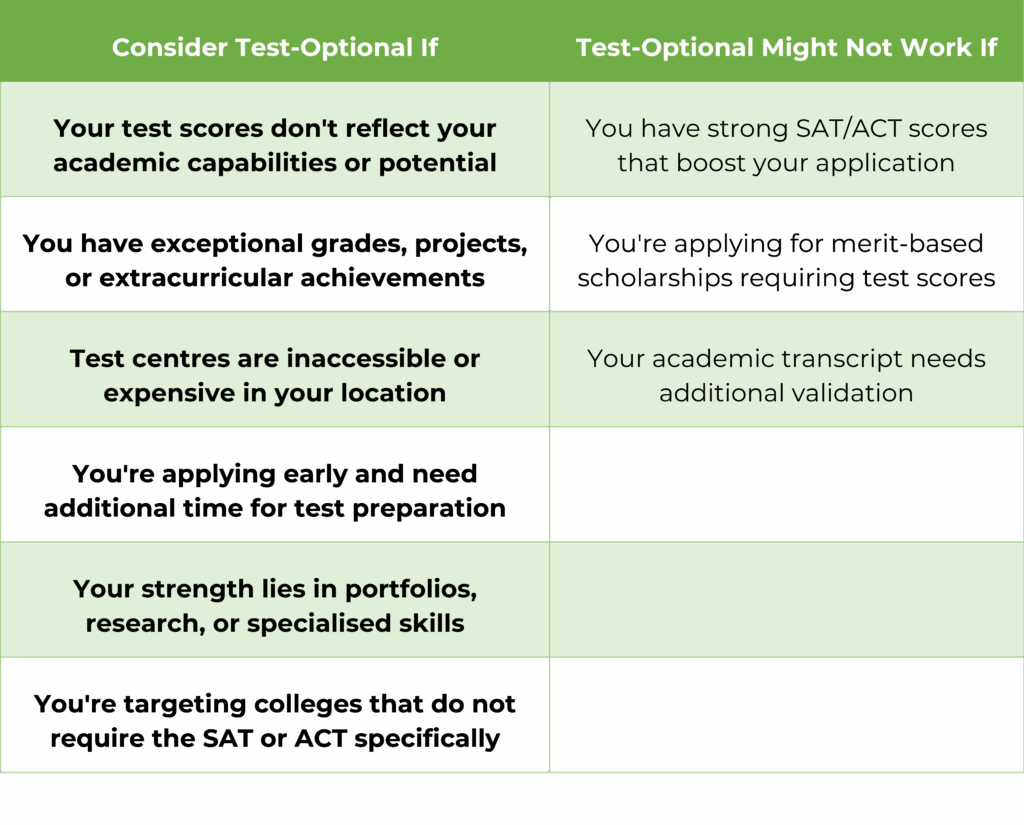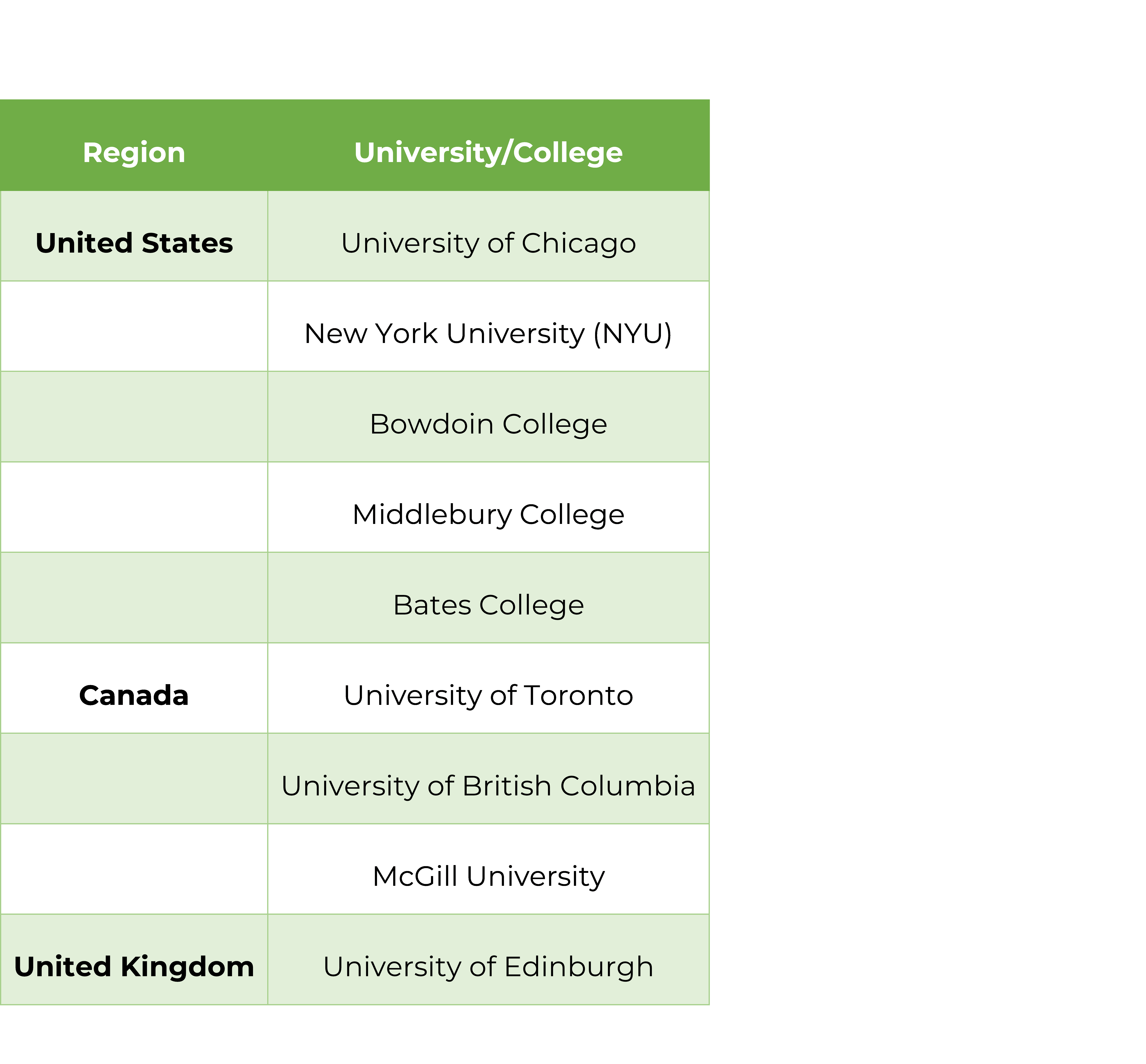In the U.S., more than 1,900 universities have removed the requirements for the SAT and ACT, which is approximately 80% of all 4-year schools in the USA alone. This change allows Indian students to apply to most top universities in the world without the need to provide standardised tests. The rise of test-optional colleges has fundamentally changed the game, allowing your academic achievements, passion projects, and unique experiences to take centre stage instead of a single test score. These test-optional policies provide opportunities to prestigious international programs you may have thought were out of reach.
What Is “Test-Optional”?
Test-optional colleges allow applicants to decide whether or not to submit standardised test scores. This flexible approach recognises that academic potential is far more than a single test score.
These are the various policies adopted by test-optional colleges:
1. Test-optional: You have the option of submitting Scholastic Assessment Test (SAT) or American College Testing (ACT) scores, or not.
2. Test-blind: Universities disregard scores, whether you choose to provide them or not.
3. Test-flexible: Other exams or assessments are accommodated.
Colleges that do not require the SAT or ACT still welcome these scores if they strengthen your application. What colleges are test-optional varies by institution, and each has its own specific policy. Most colleges that do not require SAT or ACT have implemented these changes to create more inclusive admissions processes.
What Are ACT and SAT Tests?
Before looking at test-optional universities, let’s break down what are ACT and SAT tests and their traditional role in admissions.
 What is ACT test vs SAT comes down to format and focus. Knowing the differences helps determine when should you take ACT and SAT. With the growth of colleges without ACT or SAT requirement, these decisions become more flexible for international applicants.
What is ACT test vs SAT comes down to format and focus. Knowing the differences helps determine when should you take ACT and SAT. With the growth of colleges without ACT or SAT requirement, these decisions become more flexible for international applicants.
Why International Universities Are Going Test-Optional
Several countries now follow test-optional admissions, especially for international students. In Canada and Australia, most universities do not require SAT or ACT scores and focus instead on high school grades or curriculum-based qualifications. Some European universities, particularly in Germany and the Netherlands, accept SAT scores on an optional basis for select programmes taught in English.
The shift toward test-optional colleges and universities is driven by practical reasons that support international students:
- Pandemic disruptions: Limited test centre access globally
- Broader evaluation focus: Greater emphasis on complete student profiles
- Barrier reduction: Minimising socioeconomic obstacles in admissions
- International accessibility: Acknowledging diverse educational systems worldwide
This trend has made colleges that do not require the SAT or ACT more accessible to Indian students who face geographic or economic constraints in test preparation and administration. The SAT ACT test-optional movement reflects universities’ commitment to evaluating students through multiple lenses.
Should Indian Students Consider Applying Test-Optional?
Deciding on applying test-optional depends on specific factors related to your academic profile and circumstances:
 SAT test optional universities still value academic excellence – they’re just evaluating it through different metrics.
SAT test optional universities still value academic excellence – they’re just evaluating it through different metrics.
How to Strengthen Your Application Without SAT/ACT
Applying test-optional means your application components must work harder to demonstrate your academic readiness and potential:
 Pro Tip: Focus on achievements that reflect intellectual curiosity and initiative – qualities that test optional universities specifically seek in applicants.
Pro Tip: Focus on achievements that reflect intellectual curiosity and initiative – qualities that test optional universities specifically seek in applicants.
List of Popular Test-Optional Colleges for Indian Applicants
Choosing the right university involves considering academic fit, campus culture, and long-term career opportunities. The following prestigious universities that are test-optional welcome applications from Indian students: These SAT test-optional universities are just a fraction of institutions embracing flexible admissions policies. Each has specific requirements for colleges that do not require the SAT or ACT, so research individual policies carefully.
These SAT test-optional universities are just a fraction of institutions embracing flexible admissions policies. Each has specific requirements for colleges that do not require the SAT or ACT, so research individual policies carefully.
Pros and Cons of Applying Test Optional
Here are both advantages and limitations to help make informed decisions about test-optional policies:
Advantages
- Reduced stress: Less pressure from standardised test preparation
- Cost savings: Avoid expensive test fees and preparation courses
- Time efficiency: Focus energy on other application components
- Complete evaluation: Universities assess your full profile
- Accessibility: Removes barriers for students in remote locations
Considerations
- Scholarship limitations: Some merit scholarships still require test scores
- Competitive programs: High-demand majors at top universities often consider test scores, especially in schools with a high college ranking
- Peer comparison: Other applicants submit impressive test scores
- Future requirements: Graduate programs still expect standardised tests
Test-optional colleges and universities evaluate applications through multiple perspectives, meaning every component carries additional weight in demonstrating your readiness for university-level work.
Key Takeaways
- The rise of test-optional colleges creates more access for Indian students pursuing global education.
- Strong grades, portfolios, and projects can support your application in place of test scores.
- Research each university’s policy to understand how test-optional admissions work.
- Clear, authentic essays and extracurriculars carry more weight when scores aren’t submitted.
- Strategic planning and expert guidance improve your chances of admission without test scores.
Not sure if test-optional is the right route? Talk to a Mindler Career Coach to plan your next step and create an application strategy that showcases your unique strengths.
FAQs
What are ACT and SAT tests used for in college admissions?
ACT and SAT tests traditionally serve as standardised measures of college readiness, assessing skills in mathematics, reading, and writing. With the rise of test-optional colleges, these scores are becoming optional components rather than mandatory requirements for universities worldwide.
What colleges are test-optional for international students?
Prestigious institutions, including the University of Chicago, NYU, University of Toronto, and University of Edinburgh, have adopted test-optional policies. The list of universities that are test-optional continues growing, with hundreds of institutions now offering flexible admissions pathways for international applicants.
Should I still take the SAT or ACT in 2025?
This depends on your target universities and personal strengths. If you’re confident about achieving high scores and applying to competitive programs, taking these tests can strengthen your application. SAT ACT test-optional policies mean you can build compelling applications without them, focusing instead on other achievement areas.
Do test-optional colleges still offer scholarships?
Most test-optional universities offer need-based financial aid without requiring test scores. Some merit-based scholarships still require SAT/ACT scores for consideration. Research specific scholarship requirements at your target colleges that do not require SAT or ACT to learn about funding opportunities.
Can I get into top colleges without SAT or ACT scores?
Yes. Top-tier test-optional colleges and universities have admitted exceptional students based on applications showcasing academic excellence, leadership, and unique talents. The key is demonstrating college readiness through alternative metrics like rigorous coursework, research projects, and meaningful extracurricular involvement.








